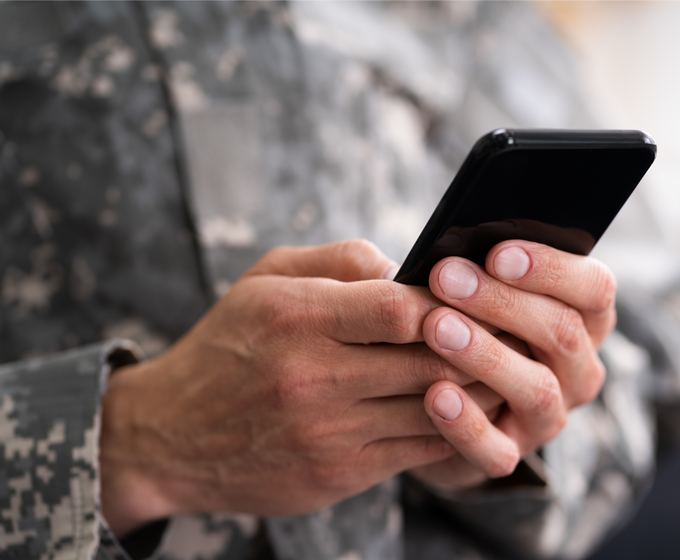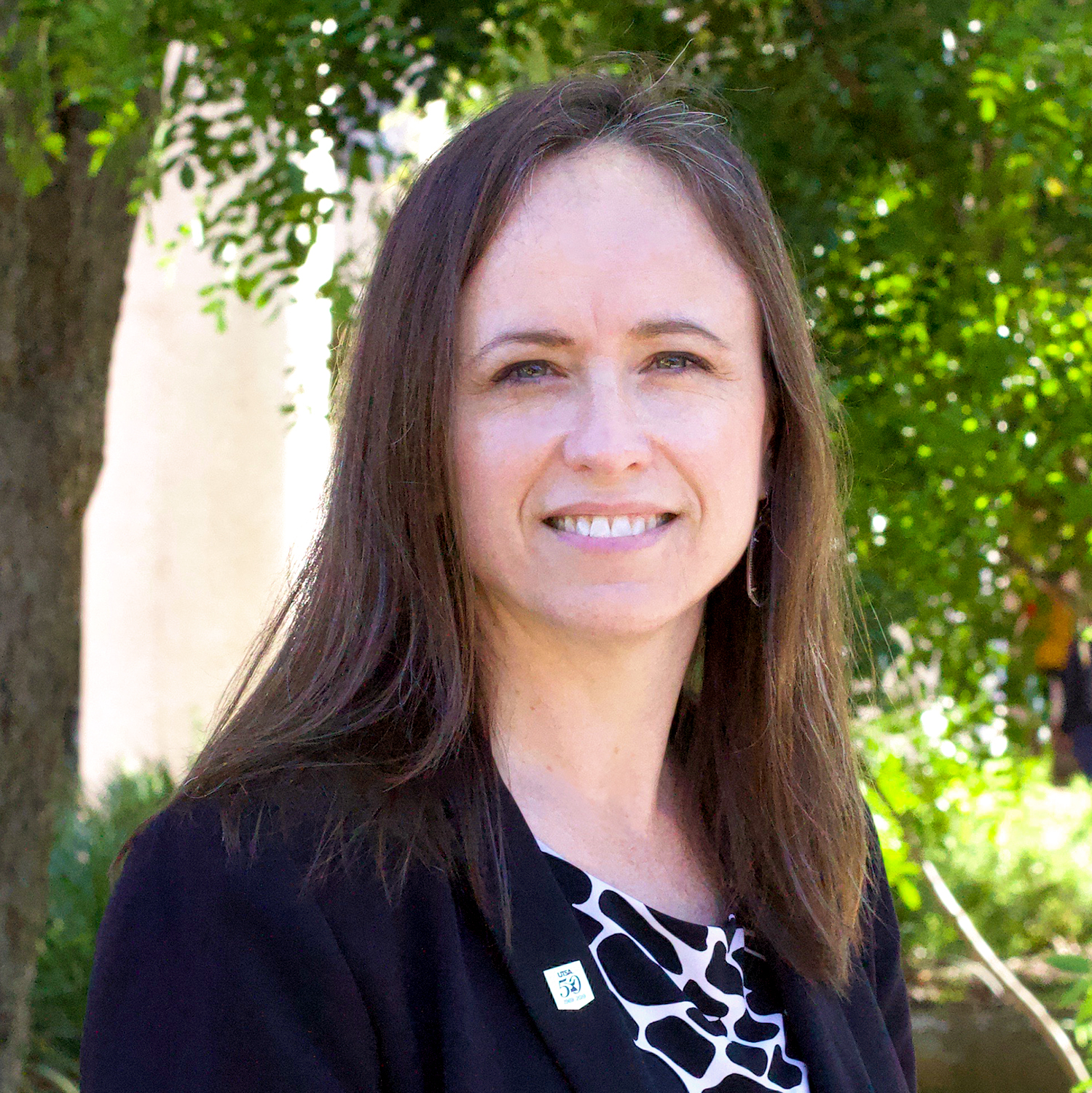Posted on August 24, 2020 by Amanda Cerreto
 Many student-veterans miss the camaraderie of the military when they set foot on campus, so they naturally seek connections with other veterans during their college experiences.
Many student-veterans miss the camaraderie of the military when they set foot on campus, so they naturally seek connections with other veterans during their college experiences.
As the pandemic rages on, though, advocates and psychologists worry about the social support surrounding veterans as their feelings of isolation and loneliness may be intensifying.
In an effort to foster those connections, the Office of Veteran and Military Affairs at UTSA is launching a phone campaign this week called Operation Buddy Check to reach out to all 1,600 student-veterans enrolled at the university.
Operation Buddy Check is a collaborative effort between VMA, its student-veteran employees and family members, and UTSA's veteran affinity group Rowdy Warrior Veteran Military Alliance.
According to Lisa Carrington Firmin, associate vice president for veteran and military affairs at UTSA, the call campaign was largely inspired by the research of Sandra Morissette, a clinical psychologist, professor and interim chair of the Department of Psychology at UTSA, and Michael Logan '10, M.Ed. '11, Ph.D. '19, the university's associate director of veteran and military affairs.

Sandra Morissete, interim chair of the Department of Psychology
Morissette was funded by the Veterans Administration in May to study the impact of changing social networks during COVID-19 on mental health and suicide in veterans. She also emphasized the importance of social support for veterans during the pandemic in a July article in U.S. Medicine . She said that it's harder for most of us to ask for help than to be offered, but it may be even more difficult for veterans.
"Service members are trained to be very self-sufficient, and some believe that asking for help is a sign of weakness, even though it often takes more courage and strength to ask for help," Morissette elaborated. Operation Buddy Check, she said, will get around this problem by reaching out. Simply making that call can mean a world of difference.
Speaking directly with veterans and family members will also mean a world of difference to those on the other end.
Logan has done extensive research on a veteran's sense of belonging, and he shared one significant takeaway: "Military service is not simply another factor influencing sense of belonging like validation, social capital, engagement, and financial circumstances. Instead it is the lens through which those factors are experienced," he explained. “This means that the term ‘veteran' does not simply describe a status, it describes a culture with unique perceptions.”
The Operation Buddy Check callers will naturally be able relate to those unique perceptions.
The callers won't just be winging it, though. Preparations have been taking place over the summer. Volunteers brought questions and suggestions to a preliminary brainstorm session. Next, UTSA PEACE Center advocate Cassandra Parada developed the call flow for the campaign and escalation protocols when technical questions regarding education benefits, parking or registration arise.
Then, Odell Kelley, a former Marine and founding member of the Rowdy Warrior Veteran Military Alliance, worked with Logan to develop a FAQ sheet that the callers could reference when answering a variety of questions that may arise.
Finally, all the volunteers attended a training session to get familiar with the materials and learn how to address emergent issues that may not have been anticipated.
The process will begin this week with an email from VMA providing information about the calls, when they will take place and what to expect from the check-ins. The email will include a list of resources and benefits designed specifically for veterans, Parada said.
She felt that joining the efforts of Operation Buddy Check would be an honor and unique opportunity to engage with fellow veterans at UTSA and get them the help they may need.
“Similar to first responders, military veterans share a culture that requires discipline to set personal needs aside, which can increase resiliency but also have the negative impact of creating suffering,” said Parada, a veteran, military spouse, social worker and member of the Rowdy Warrior Veteran Military Alliance. “The opportunity to volunteer and provide social support to our veterans will help to promote resiliency and decrease suffering. It also creates the reciprocal effect of giving back to my brothers and sisters in arms.”
Josh Trigo, a caller who's a veteran and contract negotiator for UTSA's Office of Contracts and Industry Agreements, was inspired to volunteer because the pandemic reminded him of his deployments. As a soldier, he would be in physical isolation with his fellow servicemembers for days, weeks and months with the only communication between family and friends coming from letters and video calls.
During that time, military personnel called “Battle Buddies” would lend him an ear and check on his mental and physical well-being. He views Operation Buddy Check as extension of that program for the higher education and virtual settings.
“We all need an outlet and to voice our challenges, even if it has nothing to do with school,” Trigo said. “These are very challenging times and our ability as military members only goes to prove that endurance, discipline, courage, and concern for fellow military should never end when the uniform is put up in the closet.”
In the event that student veterans are experiencing a financial or emotional crisis, the callers will also have the tools available to connect those vets with VMA's vast network of resources.
“We want to reach out to our student veterans to see how they are doing and let them know that the community of faculty, staff, and other students who served are ready to support them however we can,” Logan said.
Logan doesn't see this call campaign as a one-time effort during a unique time in which UTSA's student-veterans are being thrust to remote environments. He knows VMA will need to be more responsive to the constantly changing needs of student veterans and the fluidity of higher education going forward.
His goal is to ensure Operation Buddy Check becomes a regular collaboration among VMA, students, staff, and faculty that recognizes and supports veteran culture at UTSA. Morissette can also see the invaluable possibilities.
“I think Operation Buddy Check is a great idea and has huge potential to identify student veterans in need—now or in the future—who may not know how or where to reach out for help or get support,” she said. “Most importantly, the people at VMA who are designing this program really care, and that alone should help student veterans to know that UTSA is trying to support them in a meaningful way.”
The development of this program has already exceeded Carrington Firmin's original idea and initial expectations.
“I expected some collaboration and assistance from other offices and groups, but the level of collaboration that has emerged is an outstanding example of how the UTSA community truly cares about veterans,” she said. “I am very proud of all those who contributed and already offered to be part of the continuing outreach efforts.”
This article originally appeared in UTSA Today.
Visit UTSA’s Office of Veteran and Military Affairs online.

